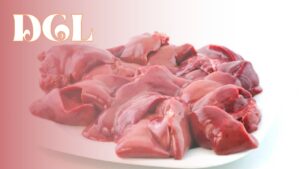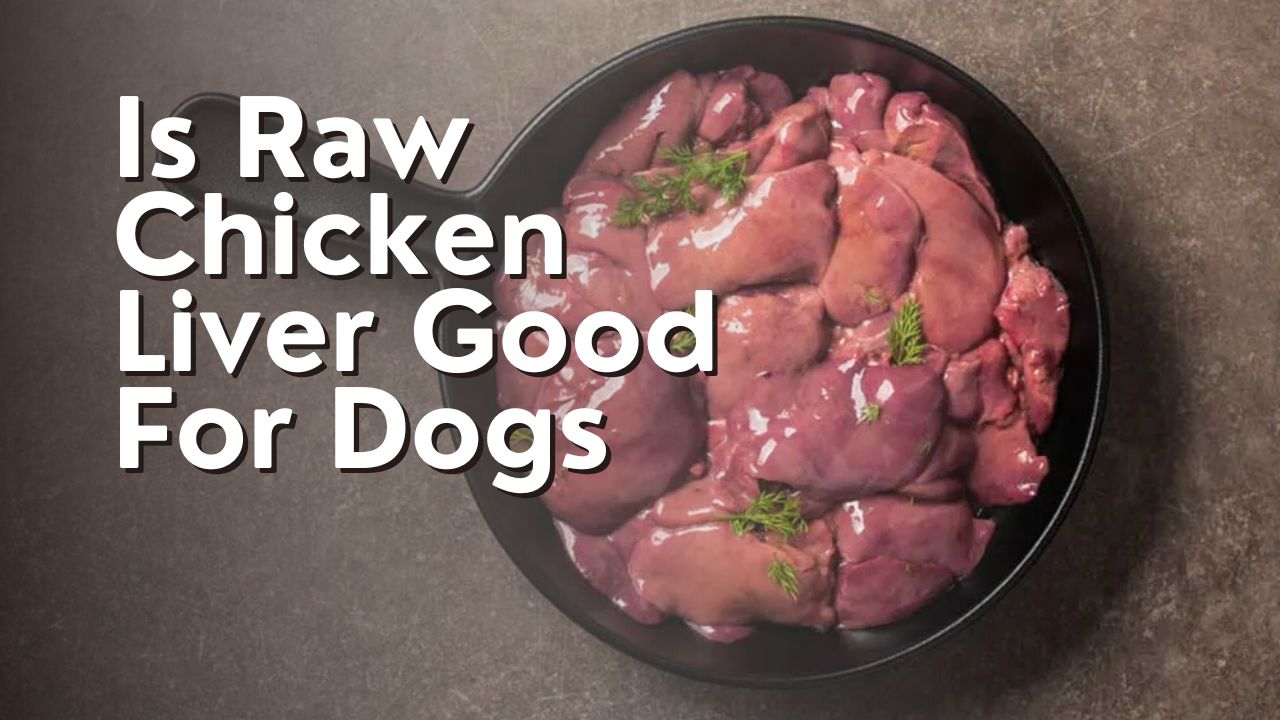Hey there, dog lovers!
Have you ever wondered if raw chicken liver is good for your furry friend? Well, I’m here to shed some light on this topic. As a pet owner myself, I understand the importance of providing our dogs with a balanced and nutritious diet.
Raw chicken liver is often touted as a beneficial addition to a canine’s meal plan, thanks to its rich nutrient profile. However, it’s essential to consider both the potential benefits and risks before incorporating it into your pup’s diet.
In this article, I will explore the nutritional benefits of raw chicken liver for dogs, as well as the precautions you should take. Additionally, I will provide feeding guidelines and alternative options for canine nutrition, so you can make an informed decision for your four-legged companion.
So, let’s dig in and find out if raw chicken liver is a good choice for your dog’s health and well-being.
Nutritional Benefits of Raw Chicken Liver for Dogs
Feeding your furry friend raw chicken liver can provide them with a multitude of nutritional benefits! Raw chicken liver is packed with essential nutrients that can contribute to your dog’s overall health and well-being.
One of the main benefits of raw chicken liver for dogs is its high protein content. Protein is crucial for the growth and repair of tissues, and it also helps to maintain a healthy coat and skin. Additionally, raw chicken liver is an excellent source of vitamins A and B, which are essential for proper vision, immune function, and energy metabolism.
Furthermore, raw chicken liver contains minerals such as iron and zinc, which play a vital role in the formation of red blood cells and a healthy immune system. These minerals are necessary for maintaining healthy bones and teeth as well.
Feeding your dog raw chicken liver can also provide them with omega-3 fatty acids, which have anti-inflammatory properties and promote a healthy heart and brain function. These fatty acids can also contribute to a shiny coat and reduce skin irritations.
However, it’s important to remember that moderation is key when feeding your dog raw chicken liver. Too much liver can lead to an excessive intake of certain vitamins and minerals, which can be harmful to your furry friend. It is recommended to consult with your veterinarian to determine the appropriate amount to feed your dog based on their specific needs.
In conclusion, raw chicken liver can be a beneficial addition to your dog’s diet, providing them with essential nutrients that support their overall health and well-being.
Potential Risks and Precautions
Be sure to consider the potential dangers and take necessary precautions when offering this to your furry friend. While raw chicken liver can provide numerous nutritional benefits to dogs, it is important to be aware of the potential risks associated with feeding it to them.
Here are some important points to keep in mind:
- Salmonella and E. coli: Raw chicken liver can be contaminated with harmful bacteria such as Salmonella and E. coli. These bacteria can cause serious illnesses in dogs, leading to symptoms like diarrhea, vomiting, and dehydration. It is crucial to handle and store raw chicken liver properly to minimize the risk of bacterial contamination.
- Overconsumption: Feeding too much raw chicken liver to your dog can lead to an imbalance in their diet. While it is a good source of essential nutrients, an excessive intake can cause digestive upset and nutrient imbalances. It is recommended to consult with a veterinarian to determine the appropriate amount of raw chicken liver to feed your dog based on their specific needs.
- Allergies and intolerances: Some dogs may have allergies or intolerances to chicken or other poultry products. It is important to monitor your dog closely for any adverse reactions after feeding them raw chicken liver. If you notice any signs of allergies, such as itching, skin rashes, or gastrointestinal issues, discontinue feeding it to your dog and consult with a veterinarian.
Remember, while raw chicken liver can offer certain nutritional benefits to dogs, it is essential to weigh the potential risks and take necessary precautions to ensure the safety and well-being of your furry friend.

Feeding Guidelines and Recommendations
When it comes to incorporating this nutrient-rich organ meat into your pup’s diet, it’s important to follow feeding guidelines and recommendations. Feeding your dog raw chicken liver can provide them with essential vitamins and minerals, but it’s crucial to do so in moderation. Too much liver can lead to an imbalance in nutrients and may cause digestive issues.
To ensure your dog’s health and safety, it’s recommended to feed them chicken liver as a treat or as part of a balanced diet. The table below outlines some general guidelines for feeding raw chicken liver to dogs:
| Dog Size | Amount of Chicken Liver |
|---|---|
| Small (1-20 lbs) | 1-2 teaspoons |
| Medium (21-50 lbs) | 1-2 tablespoons |
| Large (51-90 lbs) | 2-3 tablespoons |
| Extra Large | 3-4 tablespoons |
| (91+ lbs) |
Remember to adjust the portion size based on your dog’s specific needs and consult with your veterinarian for personalized recommendations. It’s also important to source high-quality chicken liver from a reputable supplier to minimize the risk of bacterial contamination.
In conclusion, while raw chicken liver can be a nutritious addition to your dog’s diet, it should be fed in moderation and as part of a balanced meal plan. Always follow feeding guidelines, consult with your vet, and prioritize your dog’s health and well-being.
Alternative Options for Canine Nutrition
Cooked chicken liver can be a safer alternative to raw chicken liver for dogs. It is important to note that while raw liver can potentially contain harmful bacteria, cooking the liver thoroughly can help eliminate any potential risks.
Additionally, commercial dog food can provide a balanced diet for dogs, as it is formulated to meet their nutritional needs. However, supplementing their diet with other nutritious foods, such as vegetables or fruits, can also be beneficial for their overall health.
Cooked Chicken Liver as a Safer Alternative
Cooked chicken liver provides a safer alternative for your furry friend. Raw chicken liver can pose a risk of salmonella and other bacterial infections. Cooking the liver helps eliminate these potential hazards. By properly preparing and cooking the liver, you can ensure it is safe for your dog to consume.
Cooking the liver also helps break down the proteins, making them more easily digestible for your pet. Not only is cooked chicken liver a safer option, but it is also packed with essential nutrients. It is a great source of protein, iron, and vitamin A.
These nutrients can support your dog’s immune system, promote healthy digestion, and contribute to a shiny coat. So, next time you want to treat your dog with some liver, opt for the cooked version to keep them happy and healthy.
Commercial Dog Food and Balanced Diets
Commercial dog food provides a convenient and well-balanced option for ensuring your furry friend gets all the nutrients they need. It is carefully formulated to meet the specific nutritional requirements of dogs at different life stages. Here are five benefits of feeding your dog commercial dog food:
- Convenience: Commercial dog food is easy to store, serve, and feed, making it a hassle-free choice for busy pet owners.
- Nutritional balance: These foods are formulated to provide dogs with a balanced diet, containing the right amount of proteins, carbohydrates, fats, vitamins, and minerals.
- Quality control: Reputable dog food brands follow strict quality control measures to ensure the safety and quality of their products.
- Variety: There is a wide range of commercial dog food options available, catering to different dietary preferences, sensitivities, and health conditions.
- Expert research: Commercial dog foods are developed based on scientific research and the expertise of veterinarians and nutritionists, ensuring your dog’s nutritional needs are met.
Supplementing with Other Nutritious Foods
Adding fresh fruits and vegetables to your dog’s diet can provide additional vitamins and minerals for optimal health. However, it’s important to note that not all foods are safe for dogs to consume.
When it comes to supplementing your dog’s diet with other nutritious foods, it’s essential to consider their specific dietary needs and any potential allergies or sensitivities they may have.
While raw chicken liver can be a nutritious addition to a dog’s diet, it should be given in moderation. Too much liver can lead to an excess of vitamin A, which can be harmful to dogs.
It’s always best to consult with your veterinarian before introducing any new foods to your dog’s diet to ensure they are getting a balanced and healthy meal.

Conclusion: Making the Best Decision for Your Dog
When deciding what to feed your dog, it is important to consider all factors, including their specific dietary needs and any potential risks associated with certain foods. While raw chicken liver can be a nutritious option for dogs, it is essential to weigh the benefits against the risks. On one hand, chicken liver is packed with essential nutrients such as protein, vitamins A and B, iron, and zinc, which can contribute to a healthy diet for your furry friend. However, it is crucial to acknowledge the potential risks of feeding raw chicken liver to dogs. Raw meat can contain harmful bacteria like Salmonella or Campylobacter, which can lead to foodborne illnesses in both dogs and their owners. To make an informed decision, it is advisable to consult with your veterinarian and consider alternative options such as cooked chicken liver or commercially prepared raw dog food. Remember, the health and well-being of your dog should always be the top priority.
Frequently Asked Questions
Can raw chicken liver be given to dogs with certain health conditions?
Raw chicken liver can be given to dogs with certain health conditions. However, it is important to consult with a veterinarian first to ensure it is safe and suitable for your dog’s specific needs.
Are there any specific breeds of dogs that should not consume raw chicken liver?
There are no specific breeds of dogs that should not consume raw chicken liver. It is generally safe for all breeds, but it’s important to consult with a veterinarian before making any dietary changes.
Can raw chicken liver be given as a treat or should it be included in regular meals?
Raw chicken liver can be given as a treat or included in regular meals for dogs. It’s a nutritious option that provides essential nutrients. However, moderation is key to maintaining a balanced diet.
Are there any signs or symptoms to watch out for if a dog has consumed too much raw chicken liver?
There are a few signs to watch out for if a dog has consumed too much raw chicken liver. These may include vomiting, diarrhea, abdominal pain, and loss of appetite. If you notice any of these symptoms, it’s best to consult a veterinarian.
What are some alternative sources of nutrients that can be included in a dog’s diet instead of raw chicken liver?
Some alternative sources of nutrients that can be included in a dog’s diet instead of raw chicken liver are cooked beef liver, cooked chicken breast, and a variety of fruits and vegetables.
Conclusion
In conclusion, after considering the nutritional benefits and potential risks, I believe that raw chicken liver can be a good addition to a dog’s diet.
However, it is important to take precautions and ensure that it is sourced from a reputable and safe supplier.
Additionally, it should be fed in moderation and as part of a balanced diet.
If you have concerns or prefer alternative options, consulting with a veterinarian is always a wise decision.
Ultimately, making the best decision for your dog’s health and well-being is crucial.


